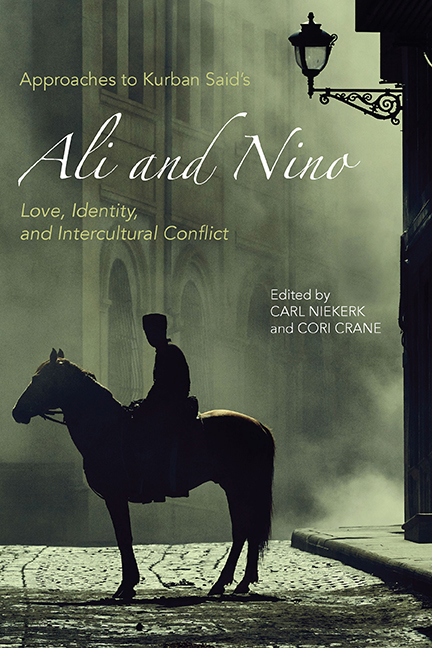Book contents
- Frontmatter
- Contents
- Acknowledgments
- Notes on Editions of and References to Ali and Nino
- Introduction: Ali and Nino as World Literature
- 1 Ali and Nino: The Novel as/of Cultural Translation
- 2 Crossing Borders, Crossing Disciplines: Ali and Nino in the Twenty-First Century
- 3 Glowing Rubies and Persian Daggers: The Role of Persian Poetry in Ali and Nino
- 4 Gendered Stereotypes and Cross-Cultural Moral Values through the Eyes of Kurban Said
- 5 Orientalist Itineraries: Cultural Hegemony, Gender, Race, and Religion in Ali and Nino
- 6 Gendered Conflicts in Muslim and Christian Cultures: Honor (and Shame) in Ali and Nino
- 7 Love and Politics: Retelling History in Ali and Nino and Artush and Zaur
- 8 “Herr Professor, Please: We'd Rather Stay in Asia”: Ali Khan Shirvanshir and the Spaces of Baku
- 9 The Female Body and the Seduction of Modernity in Ali and Nino
- 10 Seeing the Unseen: Symbolic Writing in Ali and Nino
- 11 Ali and Nino and Jewish Questions
- 12 Between Orientalism and Occidentalism: Culture, Identity, and the “Clash of Civilizations” in Ali and Nino
- Works Cited
- Notes on the Contributors
- Index
9 - The Female Body and the Seduction of Modernity in Ali and Nino
Published online by Cambridge University Press: 30 August 2017
- Frontmatter
- Contents
- Acknowledgments
- Notes on Editions of and References to Ali and Nino
- Introduction: Ali and Nino as World Literature
- 1 Ali and Nino: The Novel as/of Cultural Translation
- 2 Crossing Borders, Crossing Disciplines: Ali and Nino in the Twenty-First Century
- 3 Glowing Rubies and Persian Daggers: The Role of Persian Poetry in Ali and Nino
- 4 Gendered Stereotypes and Cross-Cultural Moral Values through the Eyes of Kurban Said
- 5 Orientalist Itineraries: Cultural Hegemony, Gender, Race, and Religion in Ali and Nino
- 6 Gendered Conflicts in Muslim and Christian Cultures: Honor (and Shame) in Ali and Nino
- 7 Love and Politics: Retelling History in Ali and Nino and Artush and Zaur
- 8 “Herr Professor, Please: We'd Rather Stay in Asia”: Ali Khan Shirvanshir and the Spaces of Baku
- 9 The Female Body and the Seduction of Modernity in Ali and Nino
- 10 Seeing the Unseen: Symbolic Writing in Ali and Nino
- 11 Ali and Nino and Jewish Questions
- 12 Between Orientalism and Occidentalism: Culture, Identity, and the “Clash of Civilizations” in Ali and Nino
- Works Cited
- Notes on the Contributors
- Index
Summary
WITH JUST THE TITLE OF HIS NOVEL, Ali and Nino, Kurban Said constructs the first of several binary oppositions that structure the themes and plot of the story. Upon the characters of Ali and Nino, Said stages other cultural dichotomies that characterize turn-of-the-century Baku, including Orient/Occident, Islam/Christianity, tradition/progress, ancient/modern, and male/female. It is this final dichotomy, the gender binary, that Said returns to time and time again in the novel to personify aspects of these other oppositions that are not as readily comprehended on their own. He infuses these binaries with gendered affects, emotions, and desires so that the readers can understand their magnitude. In the tradition of other narratives like Aeneas and Queen Dido of Carthage in Virgil's Aeneid or Shakespeare's Antony and Cleopatra that tell the history of the clash of two nations through the conventions of a love story, Said characterizes the themes of cultural ideology, religion, and nationalism in gendered terms. Yet, with the relatively cosmopolitan setting of Baku, Azerbaijan, where Occident and Orient meet and supposedly opposite cultures live in some degree of harmony, Said adjusts the features of this narrative convention. His story is not about the inevitable tragedy of two individuals from two irreconcilable cultures, but it is instead about the ambiguity of maintaining identity when those individuals fall in love and share spaces and traditions.
By placing the narrative perspective with Ali, Said's novel inverts the power and gender dynamics commonly associated with European novels about East/West conflicts by granting the Oriental subject interiority and control over the narrative. The Orient is given the male perspective, complete with the gendered expectations of a budding patriarch whose identity as man, Muslim, and Easterner comes into question as he is seduced by the charms and graces of the exotic, “modern” West personified by the alluring and intelligent Nino. It is my aim in this essay to explore how Kurban Said continually infuses modernity and Western ideology and culture with the seductive language of femininity. I argue that the female body becomes both the symbol of and the space upon which the question of modernization in the Orient is debated.
- Type
- Chapter
- Information
- Approaches to Kurban Said's Ali and NinoLove, Identity, and Intercultural Conflict, pp. 168 - 188Publisher: Boydell & BrewerPrint publication year: 2017

